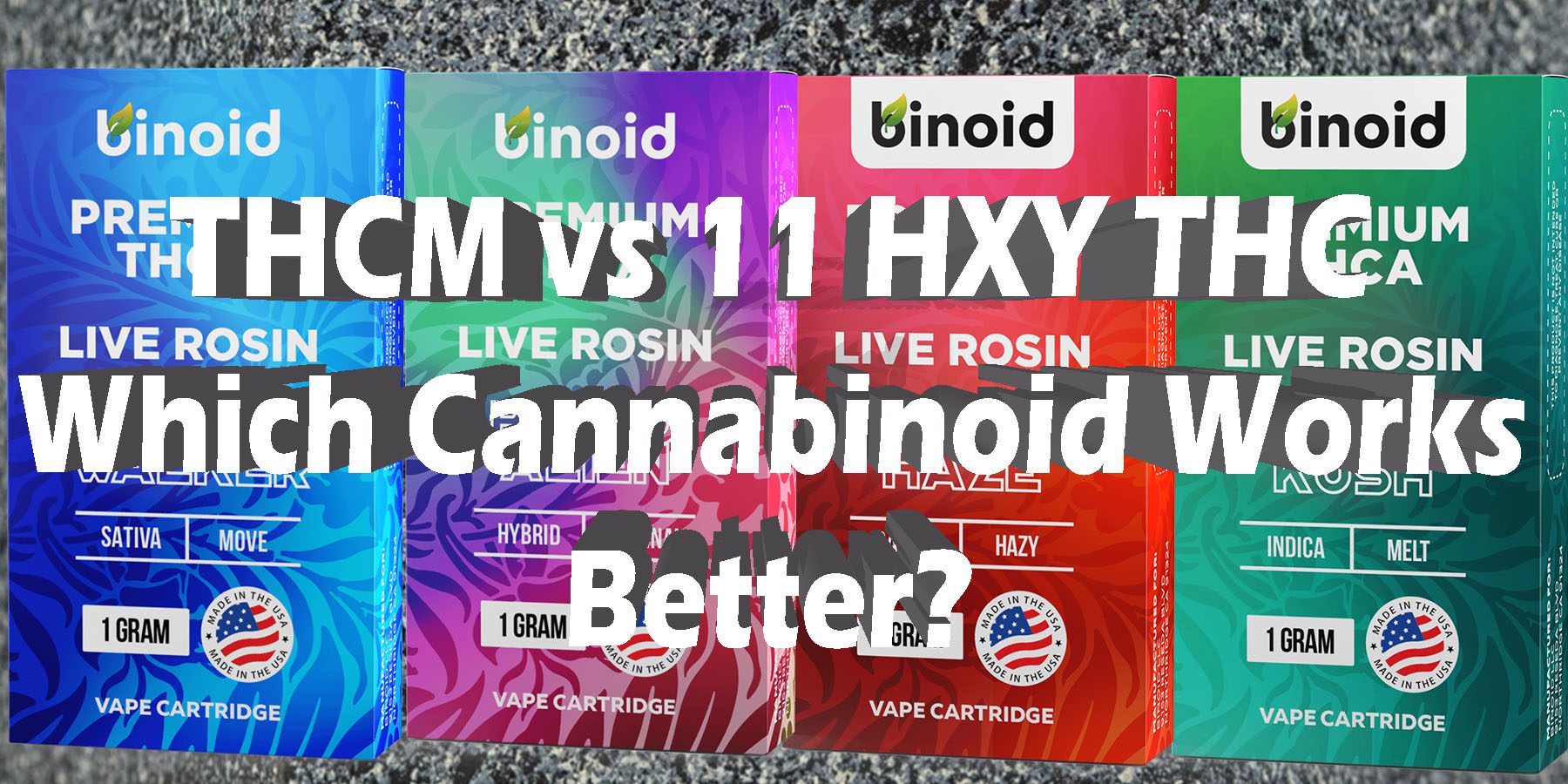
THCM vs 11 HXY: Which Cannabinoid Works Better?
THCM and 11 HXY THC are both pretty new to the market, being two unique hemp derivatives that ultimately behave in completely different ways, and thus, are sourced through very different means. Being that the average hemp enthusiast knows very little about both of them, we want to compare them to each other, to give you an idea of what to expect as they both become more prominent on the market in the coming months.
To Buy THCM Products Click Here
Why Choose THCM?
THCM Origin
THCM (11-Nor-Delta-9-Tetrahydrocannabinol-9-Carboxylic Acid {Carboxy-THC}) is a cannabis byproduct first discovered in 1997. It hasn’t ever been isolated in the cannabis plant, meaning that technically, there’s no proof that it even exists in raw cannabis. Rather, it has been identified in cannabis smoke, and is used as a biomarker to determine whether or not a fetus has been exposed to cannabis while in the womb.
THCM’s Psychoactive Properties
As of now, we don’t actually know about THCM’s psychoactive properties. Whether or not the cannabinoid can get a user high is currently unknown, but one thing that we do know is that if it is psychoactive, the effects are likely to be extremely mild. And, without knowing whether or not it’s psychoactive, we don’t know if the potential high would be more euphoric, uplifting, sedating, etc.
Purpose for Taking THCM
For now, coming across THCM on the market is very rare, and for the time-being, we’ve only seen it in vaping products, in combination with other cannabinoids that do deliver well-known psychoactive effects. Because of that, it’s clear that at least for now, THCM’s purpose is to potentiate the effects of other cannabinoids, and enhance the entourage effect.
THCM’s Legality
THCM is actually a legal cannabinoid according to federal law, when it comes from the hemp plant, because of the Farm Bill, which passed in 2018, and legalized any hemp product that contains a maximum of 0.3% delta 9 THC. THCM sounds similar to delta 9 THC in its name, but ultimately, it’s a different compound.
One thing that you need to know, however, is that 19 states have banned all THC cannabinoids, and THCM would fall into that category. So, you should assume that THCM is illegal in:
- Alaska
- Arizona
- Arkansas
- Colorado
- Delaware
- Hawaii
- Idaho
- Iowa
- Maryland
- Mississippi
- Montana
- Nevada
- New York
- North Dakota
- Oregon
- Rhode Island
- Utah
- Vermont
- Washington
Why Choose 11-Hydroxy THC?
11-Hydroxy THC Origins
11-hydroxy THC is not a cannabinoid present in cannabis, but rather a metabolite made by the body after a person has taken delta 9 THC. Delta 9 turns into 11-hydroxy THC in the liver, as part of the metabolization process in which delta 9 THC eventually breaks down and leaves the body. Basically, when you consume THC, 11-hydroxy THC emerges as the first stage of your body breaking down the cannabinoid.
In fact, 11-hydroxy THC is responsible for the distinctive effects you get from edibles. Ingesting THC means that the delta 9 is processed by the liver before it’s released into the bloodstream. At this stage, the liver turns delta 9 into 11-hydroxy THC, which allows for a completely one-of-a-kind type of high that’s unique from other delivery methods. 11-hydroxy THC can be reproduced exactly through the use of solvents, so that the body recognizes it as this modified form of THC regardless of the delivery method through which it was consumed.
11-Hydroxy THC’s Psychoactive Properties
11-hydroxy will get you high, it’s likely that it’ll feel just like you took delta 9 edibles. Because it’s already partially metabolized, it will also get you high faster. Edibles are known for their long onset time, but with 11-hydroxy THC, that process has already been mostly complete, so you can feel the effects in no time. And, it’s very bioavailable, offering a high that can be 2 to 3 times as strong as delta 9.
Purpose for Taking 11-Hydroxy THC
11-Hydroxy THC has recreational value, producing a powerful and fast-acting high similar to delta 9 THC.
11-Hydroxy THC’s Legality
11-Hydroxy THC, like THCM, is federally legal since it completed with the Farm Bill. But, because it’s inherently intoxicating, it’s banned in the same states in which THCM is also likely illegal.
Final Decision: THCM and 11 HXY THC: Two Very Different, But Equally Intriguing Hemp Derivatives
THCM and 11 HXY THC both have a mysterious air about them, as they’re new to our awareness, and very little is known about their true potentials. But, fortunately, the hemp market is exploring both of them right now, and before long, we’ll know way more about what they can offer.
In the meantime, we encourage you to try out both of these cannabinoids when they do become more available at Binoid, as we’re certain that each one promises lots of desirable effects in their own unique ways.





